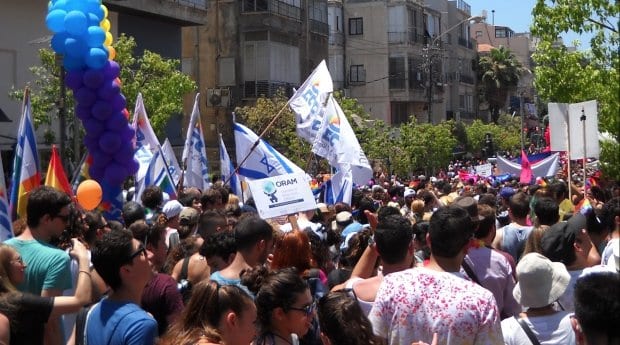I didn’t know how I felt about the Vancouver Pride Society’s (VPS) trans pledge until the Conservative party allegedly refused to sign it.
Of course, I don’t know for sure what happened behind closed doors in the Conservative party’s Vancouver Centre riding association.
When Daily Xtra reporter Jeremy Hainsworth called July 10 to ask why the riding association hadn’t signed the trans equality pledge, a member of the association insisted, off the record, that the pledge had been signed and there was no problem.
That may be true. Maybe the rumour that the Conservatives sought an exemption rather than sign the pledge was just based on a miscommunication somewhere along the line.
Or maybe riding association leadership initially refused to sign a pledge that might contradict their party’s record in government.
Maybe an initial refusal yielded to concern over local optics, and calmer heads, or a different strategy, soon prevailed. Maybe the pledge was then hastily signed to preempt the parade committee as it grappled with how much leeway, if any, to grant the local branch of Canada’s ruling party.
We may never know. What I do know is that I fully support and applaud the Vancouver Pride Society’s initiative to launch the pledge and to require its support from everyone seeking a spot in this year’s Pride parade.
When the Pride Society introduced its pledge on May 21, I had mixed feelings. I wondered if requiring people to support an idea in order to participate in our community’s parade is effectively censoring those who refuse to comply.
I wondered if any person or political party should be penalized for expressing a different perspective on trans rights (or anything, for that matter).
After all, losing access to the parade would be a penalty for any political party, especially in an election year. It’s no secret that the Vancouver Pride parade, in addition to its boisterous statement of community presence, has evolved into an excellent advertising vehicle seen by hundreds of thousands of people who now line its route each year.
Which is exactly why the Vancouver Pride Society is absolutely right to demand at least a statement of support from everyone who requests the privilege to march (and exhibit their wares) in our parade.
Why shouldn’t participants be required to support the community they’re ostensibly celebrating?
It’s not as if this particular pledge — to support equal rights for trans people in federal and provincial legislation — presents too onerous a moral stretch. At least it shouldn’t if you’re planning to walk in a parade celebrating lesbian, bisexual, gay and transgender people.
Good for the Vancouver Pride Society for injecting some substance, politics and Pride back into our Pride parade! I support your pledge, your courage to take a stand for our community, and your willingness to demand something a little more meaningful in return for marching by our side.
I was doubly impressed when the Pride Society stood firm July 22 and revoked the BC Liberal Party’s invitation after the party’s executive refused to sign the pledge.
Despite opportunity and encouragement, the party’s executive left the pledge signing to its less-influential local riding association, and hoped that would be enough.
It’s not enough, says the Pride Society — particularly with a fourth private member’s bill now on the table to explicitly protect trans people in the BC Human Rights Code.
The BC Liberal Party has had ample opportunity since 2009 to adopt gay MLA Spencer Chandra Herbert’s string of private member’s bills. They’ve allowed three bills to die on the table and have publicly stated that the fourth is unnecessary.
“This year people watching the parade can take comfort knowing that the groups they see march in the parade support trans rights and the tenants of the TEN [Trans Equality Now] campaign,” Pride Society president Tim Richards said in a press release.
“The TEN Pledge returns the VPS to its roots and the Society is taking a firm and public stance in support of a marginalized part of our community,” added vice president Chrissy Taylor.
I’m all for it. And speaking of ways to return to our political roots and re-inject substance back into Pride, I have another suggestion to consider.
I recently covered the Tel Aviv Pride parade, which is a long story and nothing if not complicated. But one of its least complicated qualities is its totally different take on what constitutes a community parade.
Rather than lining the route with spectators who watch passively as hours of community groups and corporate floats roll by, in Tel Aviv everyone marches together in the parade. The community is the parade.
An estimated 180,000 people marched in this year’s Pride parade there. Some carried signs promoting their community group or political party. Most just marched the two-and-half-hour route, filling the streets from the city’s gay centre to its promenade by the sea.
A few floats were relegated to the latter part of the parade route, rolling slowly alongside the marchers on the promenade. The floats projected a sexy sort of slideshow as they glided by — but they were hardly the main attraction.
This participants-as-Pride approach is hardly new. Most parades, including ours, started in this vein, and to this day many Vancouver spectators fall in behind the last float to follow it to the post-parade festival.
But imagine how different an expression of community Pride this might be if we all returned to the days of filling the street ourselves, signed pledges in hand — rather than passively spectating as a few thousand people in about 150 parade entries express their Pride (and some well-placed advertising) in front of us.
Robin Perelle is the managing editor of Daily Xtra in Vancouver. She can be reached at robin.perelle@dailyxtra.com or tweet her @RobinPerelle.

 Why you can trust Xtra
Why you can trust Xtra


